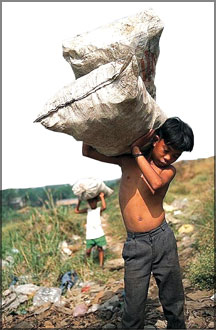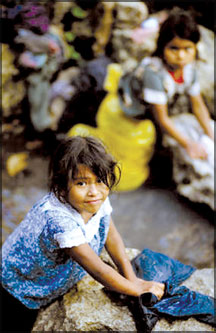Rise against child labour
 All children are entitled to an education. You may be lucky enough to
benefit from this, but did you know that there are millions of children
around the world who are denied this basic right? All children are entitled to an education. You may be lucky enough to
benefit from this, but did you know that there are millions of children
around the world who are denied this basic right?
In fact, there are millions of children like you who have been
deprived of the right to gain an education, and instead have entered the
labour market to earn a living for themselves as well as their families.
Child labour is a serious problem around the world, but is witnessed
mostly in poor, Third World countries. The problem is so severe that the
International Labour Organisation (ILO) has declared a special day, the
World Day against Child Labour, to draw attention and raise awareness
about the issue.
The special day, on June 12, will be observed this year under the
theme ‘Education: The right response to child labour’. All activities
related to the day will be held to raise awareness about this issue.

The main areas that will be highlighted are education of all children
at least upto the minimum age of employment, education policies that
address child labour by the provision of resourceful quality education
and skills training and education to promote awareness on the need to
tackle child labour.
The ILO estimates that worldwide, over 165 million children between
the ages of five and 14 are involved in working long hours in dangerous
conditions.
The problem is associated with poverty - families may not have the
monetary ability to send their children to school, while they may also
depend on the money earned by these children. It is also a well-known
fact that if given the choice between educating a girl or a boy, the
girl is at the losing end.
The irony is that child labour deprives children of education and
skills, the exact things they need to succeed in the job market. One of
the Millennium Development Goals state that education will be provided
to all children by 2015 regardless of gender, race and income levels.
Unless the following issues are seriously addressed, it won’t be easy to
attain this particular goal:
* Free and compulsory education

* Tackling barriers to girls’ education
* Access to a school and safe and quality learning essential
* Catch-up education opportunities for those who have missed formal
schooling
* Tackling the worldwide shortage of teachers and ensuring that they
are properly trained
* Laws on child labour and education
* Tackling poverty and creating decent work for adults
* Raising public awareness about the issue.
The ILO launched the World Day in June 2002 as a means of raising the
visibility of the problem and highlighting the global movement to
eliminate child labour, particularly its worst forms. |
